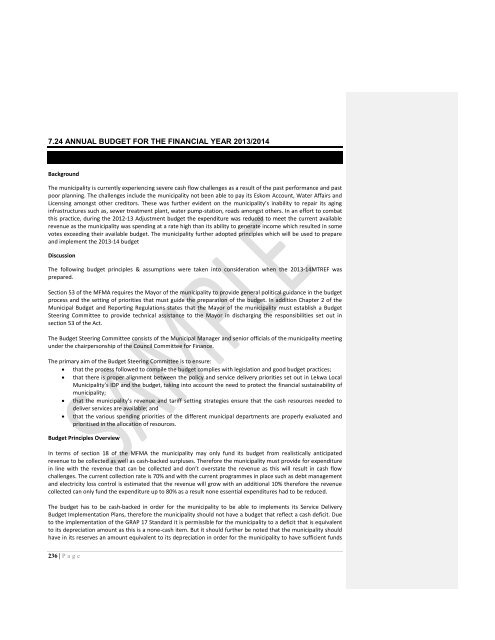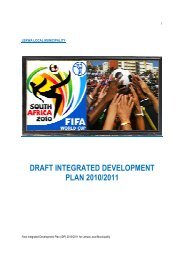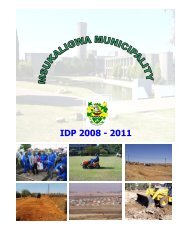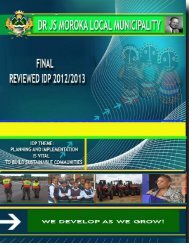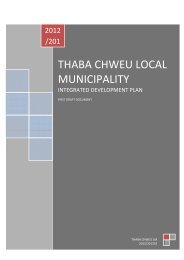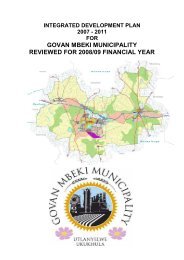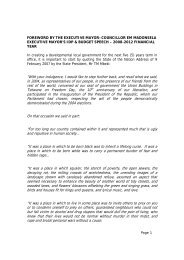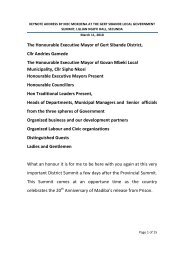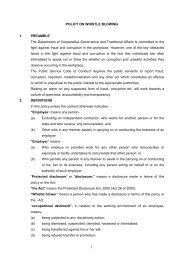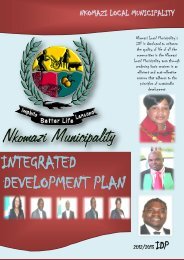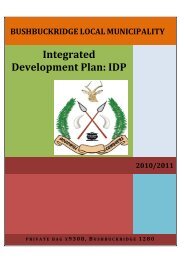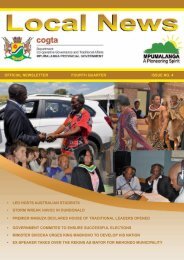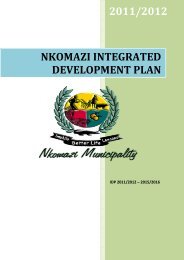Lekwa Local Municipality 2013/14 - Co-operative Governance and ...
Lekwa Local Municipality 2013/14 - Co-operative Governance and ...
Lekwa Local Municipality 2013/14 - Co-operative Governance and ...
Create successful ePaper yourself
Turn your PDF publications into a flip-book with our unique Google optimized e-Paper software.
7.24 ANNUAL BUDGET FOR THE FINANCIAL YEAR <strong>2013</strong>/20<strong>14</strong>BackgroundThe municipality is currently experiencing severe cash flow challenges as a result of the past performance <strong>and</strong> pastpoor planning. The challenges include the municipality not been able to pay its Eskom Account, Water Affairs <strong>and</strong>Licensing amongst other creditors. These was further evident on the municipality’s inability to repair its aginginfrastructures such as, sewer treatment plant, water pump-station, roads amongst others. In an effort to combatthis practice, during the 2012-13 Adjustment budget the expenditure was reduced to meet the current availablerevenue as the municipality was spending at a rate high than its ability to generate income which resulted in somevotes exceeding their available budget. The municipality further adopted principles which will be used to prepare<strong>and</strong> implement the <strong>2013</strong>-<strong>14</strong> budgetDiscussionThe following budget principles & assumptions were taken into consideration when the <strong>2013</strong>-<strong>14</strong>MTREF wasprepared.Section 53 of the MFMA requires the Mayor of the municipality to provide general political guidance in the budgetprocess <strong>and</strong> the setting of priorities that must guide the preparation of the budget. In addition Chapter 2 of theMunicipal Budget <strong>and</strong> Reporting Regulations states that the Mayor of the municipality must establish a BudgetSteering <strong>Co</strong>mmittee to provide technical assistance to the Mayor in discharging the responsibilities set out insection 53 of the Act.The Budget Steering <strong>Co</strong>mmittee consists of the Municipal Manager <strong>and</strong> senior officials of the municipality meetingunder the chairpersonship of the <strong>Co</strong>uncil <strong>Co</strong>mmittee for Finance.The primary aim of the Budget Steering <strong>Co</strong>mmittee is to ensure: that the process followed to compile the budget complies with legislation <strong>and</strong> good budget practices; that there is proper alignment between the policy <strong>and</strong> service delivery priorities set out in <strong>Lekwa</strong> <strong>Local</strong><strong>Municipality</strong>’s IDP <strong>and</strong> the budget, taking into account the need to protect the financial sustainability ofmunicipality; that the municipality’s revenue <strong>and</strong> tariff setting strategies ensure that the cash resources needed todeliver services are available; <strong>and</strong> that the various spending priorities of the different municipal departments are properly evaluated <strong>and</strong>prioritised in the allocation of resources.Budget Principles OverviewIn terms of section 18 of the MFMA the municipality may only fund its budget from realistically anticipatedrevenue to be collected as well as cash-backed surpluses. Therefore the municipality must provide for expenditurein line with the revenue that can be collected <strong>and</strong> don’t overstate the revenue as this will result in cash flowchallenges. The current collection rate is 70% <strong>and</strong> with the current programmes in place such as debt management<strong>and</strong> electricity loss control is estimated that the revenue will grow with an additional 10% therefore the revenuecollected can only fund the expenditure up to 80% as a result none essential expenditures had to be reduced.The budget has to be cash-backed in order for the municipality to be able to implements its Service DeliveryBudget Implementation Plans, therefore the municipality should not have a budget that reflect a cash deficit. Dueto the implementation of the GRAP 17 St<strong>and</strong>ard it is permissible for the municipality to a deficit that is equivalentto its depreciation amount as this is a none-cash item. But it should further be noted that the municipality shouldhave in its reserves an amount equivalent to its depreciation in order for the municipality to have sufficient funds236 | P a g e


